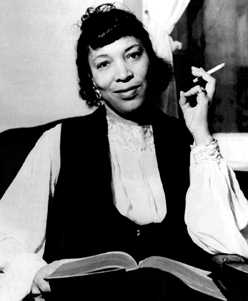Hear Zora Neale Hurston
Sing Traditional American
Folk Song
“Mule on the Mount” (1939)
Two years before the 1937 publication of her novel Their Eyes Were Watching God, Zora Neale Hurston published a collection of African-American folklore called Of Mules and Men (available online here). She did so as an authority on the subject and a trained anthropologist who had studied under the most well-regarded figure in the discipline at the time, Franz Boas. Her study was both a personal and a professional undertaking for her; although Hurston had grown up in the Deep South—in Eatonville, Florida—she credited her academic training with giving her the critical distance to really see the culture on its own terms. As she puts it in the Introduction to Of Mules and Men, she had known black Southern culture “from the earliest rocking of my cradle… but it was fitting me like a tight chemise. I couldn’t see it for wearing it…. I had to have the spy-glass of Anthropology to look through at that.”
After receiving her B.A. from Barnard, Hurston traveled extensively in the South and the Caribbean in the 1930s to document local cultures and conduct field research. Her work was partly sponsored by a Guggenheim fellowship and partly by Roosevelt’s Works Progress Administration, whose Federal Writers Project sponsored several other black writers like Ralph Ellison, Claude McKay, and Richard Wright. Working at times with celebrated folklorists Stetson Kennedy and Alan Lomax, Hurston collected recordings of Southern and Caribbean stories and folk songs, often telling or singing them herself. In the clip above, from June 18, 1939, Hurston sings a song she calls “Mule on the Mount.” In the first minute and a half of the recording, you can hear Hurston describe the song’s origins and many variations to someone (possibly Lomax) in the background. She explains how she came to know the song, first hearing it in her hometown of Eatonville. Then she begins to sing, in a high, sweet voice, with all the intonation of a true blues singer, punctuating the verses with snorts and grunts, as many folk songs—often work songs—would be, though in this case, the snorts may be mule snorts. The recording reveals Hurston as a talented interpreter of her material, to say the least.
The songs and stories Hurston collected, in addition to her childhood experiences, provided her with much of the material for her novels, stories, and plays. Several more of her WPA recordings, also sung by her, are online as mp3s at the Florida Department of State’s “Florida Memory” project. The originals are housed at the Library of Congress’s “Florida Folklife” collection. Hurston’s critical and creative work brought her renown in her lifetime not only as a writer, but as a public intellectual and folklorist as well—hear her talk, somewhat reluctantly, about Haitian zombies in a 1943 radio interview on the popular Mary Margaret McBride show. Sadly, Hurston passed her final years in obscurity and her work was neglected for a couple decades until a revival in the 70s lead by Alice Walker. She’s never been known as a singer, but after listening to the above recording, you might agree she should be.
Josh Jones is a doctoral candidate in English at Fordham University and a co-founder and former managing editor of Guernica / A Magazine of Arts and Politics.
